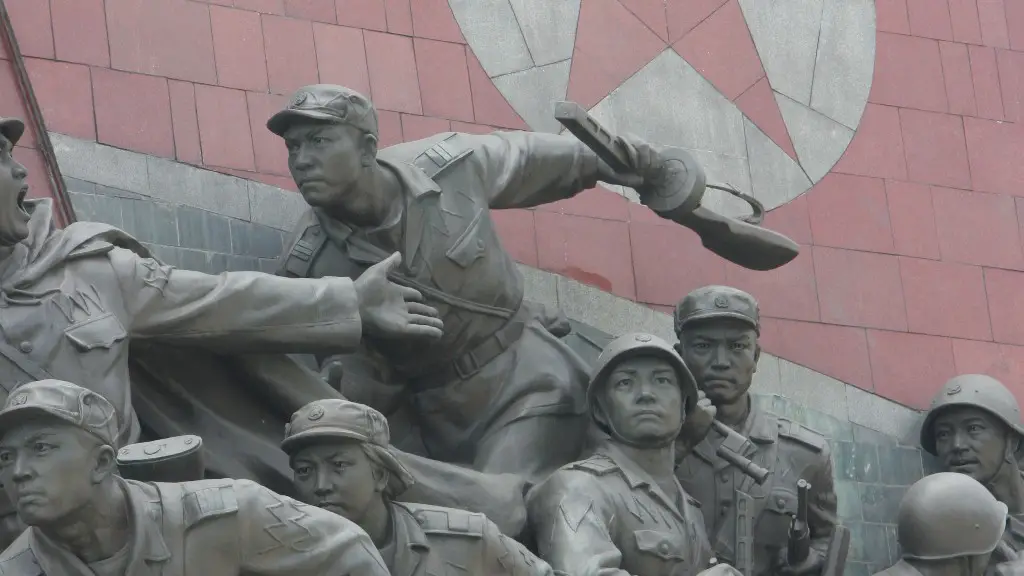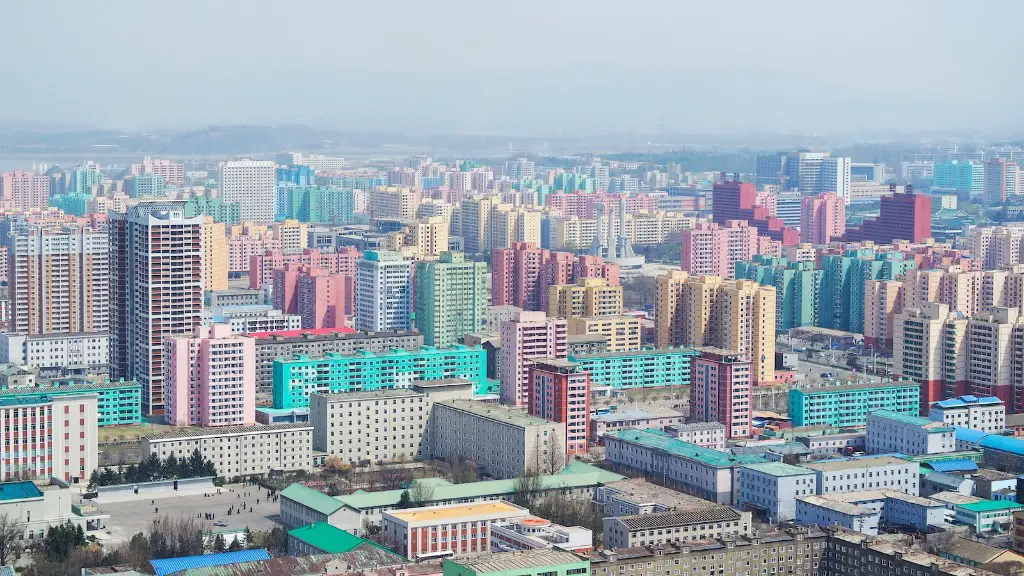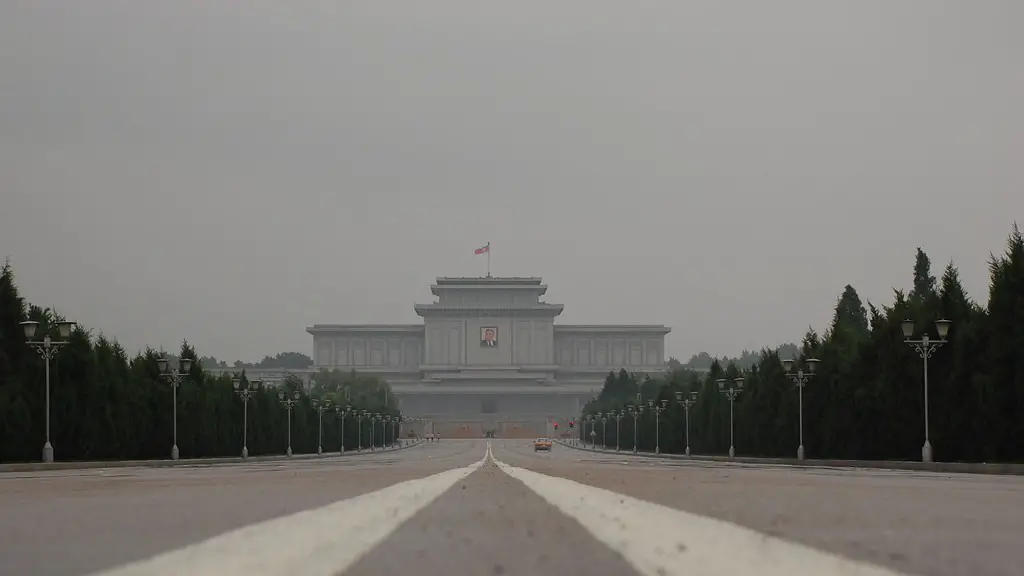Rising Tensions
North Korea is one of the world’s most secretive countries, and yet it is the center of one of the most persistent and serious international confrontations. Tensions between North Korea and the U.S. have been rising since the Trump administration has taken office, as the two nations remain at odds over North Korea’s nuclear weapons program. This nuclear arms race has the world on edge and searching for solutions to stop North Korea.
Nuclear weapons are believed to be a major way North Korea could hold the U.S. ransom and internationally project its power. Many experts have suggested that the nation’s nuclear research is being actively pursued to gain leverage for lucrative economic contracts with the international community. Despite this, North Korea continues to deny having an advanced nuclear weapon program. The refusal of the North Korea to crumble may be what sparks the current tension between the U.S. and North Korea.
U.S. Sanctions
To effectively limit North Korea’s nuclear threat, the United Nations imposed economic sanctions on North Korea in 2017. The UN Security Council also warned against any additional nuclear or missile testing, threatening to impose additional sanctions if the testing continued. The sanctions imposed on the North Korea are intended to cut off financial resources that could be used to support nuclear weapon development.
The U.S. has also imposed its own unilateral sanctions on North Korea, including banning the importation of North Korean coal, iron and seafood products into the U.S., which are some of North Korea’s main exports. The U.S. has also imposed sanctions on North Korean airlines and financial institutions in an effort to put economic pressure on North Korea.
Diplomatic Approaches
The Trump administration is attempting to both enforce and encourage through diplomatic pressure, rather than military intervention, to drive North Korea to the peaceful resolution of its nuclear crisis. President Trump and North Korean leader Kim Jung Un have held several bilateral talks that have provided some hope that a peaceful resolution could be reached.
However, as the talks have stalled, many experts worry that the lack of progress is leading to increased tensions. This could potentially raise the risk of direct military conflict between North Korea and the U.S. As a result, diplomats from the U.S. and other countries have pushed for the North Korean government to abandon its nuclear ambitions without conditions.
Military Intervention
The military option is one of the last resorts to deter North Korean aggression. Military intervention would involve a large-scale coalition force, primarily led by the U.S. In the past, North Korea has threatened retaliation if it is attacked. Any potential military intervention in North Korea would have to avoid potential civilian casualties as much as possible.
The U.S. has also made clear that it will not accept a nuclear-armed North Korea and that it will use all diplomatic, economic, and military means to ensure the denuclearization of North Korea. The U.S. has stated that while they prefer a peaceful resolution to the issue, they are willing to take military action if necessary.
China’s Influence
China is an essential element in achieving a peaceful resolution to the North Korean nuclear crisis. China has a vested interest in preventing a war with North Korea and has been a tremendous source of economic strength for the nation. China is North Korea’s main source of food, fuel, and other goods and services, and controls a large portion of North Korea’s export market.
China has sought to de-escalate the tensions between North Korea and the United States, taking a middle-ground stance, and has been key in attempting to jumpstart the stalled diplomatic talks. China also has leverage over North Korea, as it is one of its main economic partners and is also a key ally in military and diplomatic matters.
Global Voices
The situation in North Korea is of great concern to the global community and is being closely monitored by the international community. International organizations, such as the United Nations, have taken the lead in pressuring the North Korean government to reach a peaceful and lasting resolution to the nuclear crisis.
The United Nations Security Council has also taken steps to limit North Korea’s weapons program and has urged North Korea to remain within its international obligations. Additionally, the European Union has offered its own diplomatic solutions that aim to reduce the tensions between North Korea and the United States.
Pressure for Denuclearization
Ongoing negotiations between the U.S. and North Korea have focused on the process of denuclearization. U.S. Secretary of State Mike Pompeo, who has led nuclear talks with North Korea, has proposed a roadmap for a complete and verifiable denuclearization of the country, as well as long-term security and economic incentives.
While progress has been made, some experts worry that the negotiations may not be moving in the right direction, as North Korea SEEMS primarily interested in benefiting economically, rather than implementing a complete denuclearization. It is still unclear how successful these ongoing negotiations will be.
Worldwide Coalition
The international community is taking steps to limit North Korea’s nuclear ambitions and maintain peace in the region. All the involved parties are continuing their efforts to find a diplomatic solution to the nuclear crisis. The U.S., Japan and South Korea have pledged to work together to ensure that North Korea does not possess a nuclear weapon, and have reiterated their commitment to the denuclearization of the Korean peninsula.
Other countries have used their diplomatic relationships to push for a peaceful resolution. China and Russia, in particular, have used their status as North Korea’s main allies to advocate for a peaceful resolution to the crisis. This has been an important step in achieving a lasting peace in the region.
Engaging Citizens
In addition to diplomatic efforts to resolve the North Korean nuclear crisis, citizens around the world are joining forces to advocate for change. Civic and grassroot movements are striving to assert the power of the people. Alliances between diplomatic forces and civil society groups are continuously forming in order to increase public awareness and engagement in pushing for a peaceful resolution.
Citizens from all around the world are continuing to use the power of their voices to demand a more peaceful and secure international community. This is a powerful step in achieving a peaceful resolution to the North Korean nuclear issue, and it is evident that citizens are determined to find a solution.
Economic Opportunities
The economic sanctions imposed on North Korea were intended to reduce its dependence on nuclear weapons and open it up to trade. Since the sanctions were imposed, North Korea has been able to expand its exports and investments, as well as gain access to new markets. This has allowed the nation to diversify its economy and make it more resilient to changing global conditions.
The economic reforms implemented by North Korea in conjunction with the economic sanctions has had a positive impact on the North Korean economy and its citizens. As North Korea continues to build more trade ties and diversify its economy, there is a potential for an increased standard of living for the North Korean people.
Social & Cultural Reforms
The social and cultural reforms taking place in North Korea have been largely ignored by the international community. The North Korean government has attempted to take some steps toward modernization, such as increasing access to the internet for its citizens and allowing for more cultural openness and political expression.
These steps, however, have been met with some resistance from traditional North Korean values. Despite the resistance, the slow progress of modernization has been a beneficial factor in reducing international tensions and has been a strong force in de-escalating the ongoing nuclear crisis.
A Brighter Future
The North Korean nuclear crisis has been ongoing for decades and the international community has yet to find a long-term solution. Nations around the world continue to encourage and support a peaceful resolution that results in the denuclearization of the Korean peninsula.
The diplomatic efforts, economic sanctions, and social and cultural reforms are promising steps in the right direction. This momentum, as well as the increasingly active role of citizens in pressuring for a peaceful resolution, have created hope that a brighter future lies ahead for North Korea and the rest of the world.



